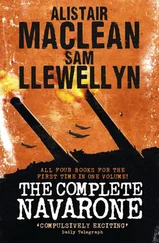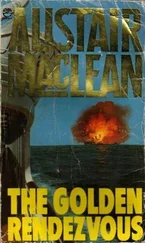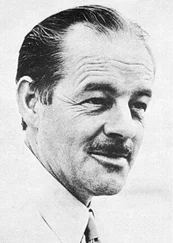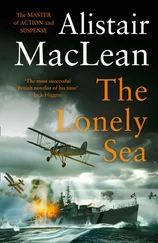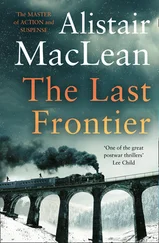The brief, all encompassing glance had taken barely ten seconds, but Mallory waited no longer. Swiftly he bent down, tied a double bowline in the end of the rope and left it lying on the edge. In an emergency they could kick it out into the darkness. It would be thirty feet short of the water, he estimated — enough to clear any launch or masted caique that might be moving about the harbour. They could drop the rest of the way, maybe a bone-breaking fall on to the deck of a ship, but they would have to risk it. Mallory took one last look down into the Stygian blackness and shivered; he hoped to God that he and Miller wouldn't have to take that way out.
Dusty Miller was kneeling on the duckboards by the top of the ladder leading down to the magazine as Mallory came running back up the tunnel, his hands busy with wires, fuses, detonators and explosives. He straightened up as Mallory approached.
«I reckon this stuff should keep 'em happy, boss.» He set the hands of the clockwork fuse, listened appreciatively to the barely audible hum, then eased himself down the ladder. «In here among the top two rows of cartridges, I thought.»
«Wherever you say,» Mallory acquiesced. «Only don't make it too obvious — or too difficult to find. Sure there's no chance of them suspecting that we knew the clock and fuses were dud?»
«None in the world,» Miller said confidently. «When they find this here contraption they'll knock holes in each others' backs congratulatin' themselves-and they'll never look any further.»
«Fair enough.» Mallory was satisfied. «Lock the door up top?»
«Certainly I locked the door!» Miller looked at him reproachfully. «Boss, sometimes I think … »
But Mallory never heard what he thought. A metallic, reverberating clangour echoed cavernously through the cave and magazine, blotting out Miller's words, then died away over the harbour. Again the sound came, while the two men stared bleakly at one another, then again and again, then escaped for a moment of time.
«Company,» Mallory murmured. «Complete with sledge-hammers. Dear God, I only hope that door holds.» He was already running along the passage towards the guns, Miller close behind him.
«Company!» Miller was shaking his head as he ran. «How in the hell did they get here so soon?»
«Our late lamented little pal,» Mallory said savagely. He vaulted over the railing, edged back to the mouth of the cave. «And we were suckers enough to believe he told the whole truth. But he never told us that opening that door up top triggered off an alarm bell in the guardroom.»
Wednesday Night
21:15 — 23:45
Smoothly, skillfully, Miller paid out the wire-cored rope — double-turned round the top rail — as Mallory sank out of sight into the darkness. Fifty feet had gone, he estimated, fifty-five, sixty, then there came the awaited sharp double tug on the signal cord looped round his wrist and he at once checked the rope, stooped and tied it securely to the foot of the stanchion.
And then he had straightened again, belayed himself to the rail with the rope's end, leaned far out over the edge, caught hold of the rope with both bands as far down as he could reach and began, slowly, almost imperceptibly at first, then with gradually increasing momentum, to swing man and rope from side to side, pendulum-wise. As the wings of the pendulum grew wider, the rope started to twist and jump in his hands, and Miller knew that Mallory must be striking outcrops of rock, spinning uncontrollably as he bounced off them. But Miller knew that he couldn't stop now, the clanging of the sledges behind him was almost continuous: he only stooped the lower over the rope, flung all the strength of his sinewy arms and shoulders into the effort of bringing Mallory nearer and still nearer to the rope that Brown would by now have thrown down from the balcony of the house where they had left him.
Far below, half-way between the cave mouth and the invisible waters of the harbour, Mallory swung in a great arc through the rain-filled darkness of the sky, forty rushing, bone-bruising feet between the extremities of the swings. Earlier he had struck his head heavily on an outcrop of rock, all but losing consciousness and his grip on the rope. But he knew where to expect that projection now and pushed himself clear each time as he approached it, even although this made him spin in a complete circle every time. It was as well, he thought, that it was dark, that he was independent of sight anyway: the blow had reopened an old wound Turzig had given him, his whole upper face was masked with blood, both eyes completely gummed.
But he wasn't worried about the wound, about the blood in his eyes. The rope — that was all that mattered. Was the rope there? Had anything happened to Casey Brown? Had he been jumped before he could get the rope over the side? If he had, then all hope was gone and there was nothing they could do, no other way they could span the forty sheer feet between house and cave. It just had to be there. But if it were there, why couldn't he find it? Three times now, at the right extremity of a swing, he had reached out with his bamboo pole, heard the hook scrape emptily, frustratingly, against the bare rock.
And then, the fourth time, stretched out to the straining limit of both arms, he felt the hook catch on! Immediately, he jerked the pole in, caught the rope before he dropped back on the downward swing, jerked the signal card urgently, checked himself gradually as he fell back. Two minutes later, near exhaustion from the sixty-foot climb up the wet, slippery rope, be crawled blindly over the lip of the cave and flung himself to the ground, sobbing for breath.
Swiftly, without speaking, Miller bent down, slipped the twin loops of the double bowline from Mallory's legs, undid the knot, tied it to Brown's rope, gave the latter a tug and watched the joined ropes disappear into the darkness. Within two minutes the heavy battery was across, underslung from the two ropes, lowered so far by Casey Brown then hauled up by Mallory and Miller. Within another two minutes, but with infinitely more caution, this time, the canvas bag with the nitro, primers and detonators, had been pulled across, lay on the stone floor beside the battery.
All noise had ceased, the hammering of the sledges against the steel door had stopped completely. There was something threatening, foreboding about the stillness, the silence was more menacing than all the clamour that had gone before. Was the door down, the lock smashed, the Germans waiting for them in the gloom of the tunnel, waiting with cradled machine-carbines that would tear the life out of them? But there was no time to wonder, no time to wait, no time now to stop to weigh the chances. The time for caution was past, and whether they lived or died was of no account any more.
The heavy Colt .455 balanced at his waist, Mallory climbed over the safety barrier, padded silently past the great guns and through the passage, his torch clicking on half-way down its length. The place was deserted, the door above still intact. He climbed swiftly up the ladder, listened at the top. A subdued murmur of voices, he thought he heard, and a faint hissing sound on the other side of the heavy steel door, but he couldn't be sure. He leaned forward to hear better, the palm of his hand against the door, drew back with a muffled exclamation of pain. Just above the lock, the door was almost red-hot. Mallory dropped down to the floor of the tunnel just as Miller came staggering up with the battery.
«That door's hot as blazes. They must be burning—»
«Did you hear anything?» Miller interrupted.
«There was a kind of hissing—»
«Oxy-acetylene torch,» Miller said briefly. «They'll be burnin' out the lock. It'll take time — that door's made of armoured steel.»
Читать дальше

